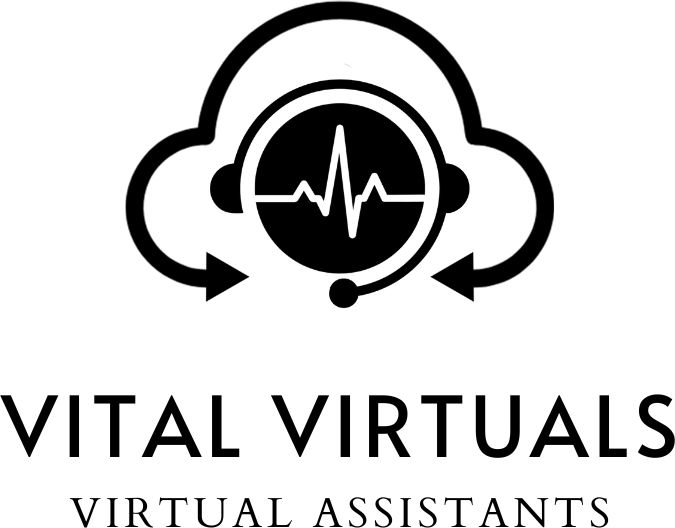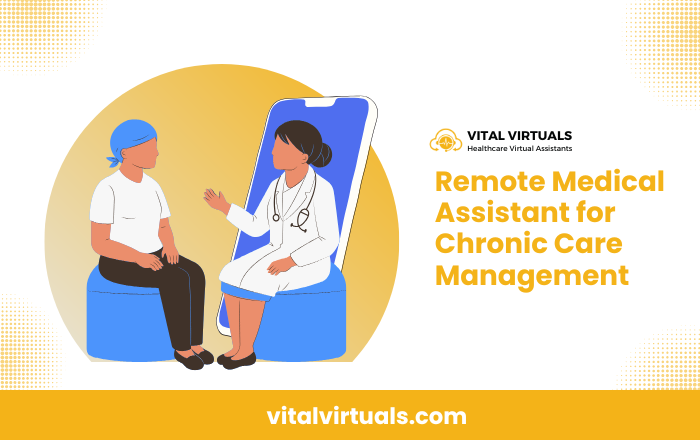Managing chronic conditions such as diabetes, hypertension, and heart disease requires ongoing attention, patient education, and regular follow-ups. For healthcare practices, keeping up with the administrative and clinical demands of chronic care management (CCM) can be overwhelming. This is where a remote medical assistant can make a significant difference. By assisting with patient coordination, monitoring, and administrative tasks, remote medical assistants help healthcare providers manage chronic care efficiently, allowing them to focus on delivering quality care.
In this article, we’ll explore how hiring a remote medical assistant for chronic care management can improve patient outcomes and increase the efficiency of your healthcare practice.
1. Improved Patient Communication and Engagement
- Key Challenge: Keeping chronic care patients engaged between visits.
- Chronic care patients need consistent communication to ensure they’re following their care plan and taking their medications properly.
- Missed appointments, delays in follow-up, or unclear instructions can lead to worsening conditions or complications.
- How a Remote Medical Assistant Helps:
- Remote medical assistants can handle patient follow-ups, ensuring regular communication through phone calls, emails, or patient portals.
- They can remind patients about upcoming appointments, medication refills, and other necessary actions.
- By providing timely responses to patient inquiries, remote assistants help improve patient engagement, which is key to managing chronic conditions effectively.
- Benefits:
- Enhanced patient adherence: Regular touchpoints keep patients on track with their care plan.
- Better outcomes: Consistent communication leads to fewer missed appointments and better management of symptoms.
- Reduced hospitalizations: Ongoing engagement can help prevent exacerbations and hospital admissions.

2. Streamlined Care Coordination
- Key Challenge: Coordinating care among multiple healthcare providers.
- Patients with chronic conditions often see multiple specialists, making care coordination a complex and time-consuming task.
- Lack of coordination can lead to conflicting treatment plans, medication errors, or duplication of tests.
- How a Remote Medical Assistant Helps:
- Remote medical assistants can coordinate care between different providers by keeping track of referrals, appointment scheduling, and sharing medical records.
- They ensure that all healthcare providers are updated on the patient’s condition and treatment plan, helping prevent overlapping treatments and ensuring cohesive care.
- Remote assistants can also help with communication between providers and patients, simplifying the process for both parties.
- Benefits:
- Seamless care: Patients receive more coordinated and organized care across multiple providers.
- Time savings: Remote medical assistants take care of the administrative tasks of coordinating care, freeing up time for providers.
- Reduced errors: Improved coordination reduces the risk of medical errors and redundant treatments.

3. Efficient Chronic Care Monitoring
- Key Challenge: Monitoring patients remotely and gathering data on their progress.
- Chronic care management involves monitoring patients’ vitals and symptoms regularly to ensure their condition is stable.
- Without constant monitoring, it’s challenging to identify early warning signs of deterioration.
- How a Remote Medical Assistant Helps:
- Remote medical assistants can track and document patient vitals and symptoms through telemedicine platforms or patient management systems.
- They can ensure that patients regularly update their health data and report any symptoms that might require attention.
- Remote assistants work with healthcare providers to adjust care plans based on the patient’s progress, helping detect any changes that may require intervention.
- Benefits:
- Proactive care: Continuous monitoring allows for early detection of complications, reducing hospital admissions and emergency room visits.
- Improved compliance: Patients are more likely to comply with regular monitoring when guided by a dedicated remote medical assistant.
- Data-driven care: Providers can make informed decisions using up-to-date data on their patients’ health status.
4. Administrative Support for Chronic Care Programs
- Key Challenge: Managing the administrative load associated with chronic care programs.
- Chronic care management involves extensive documentation, compliance with Medicare and insurance requirements, and regular reporting.
- Healthcare providers may find it difficult to keep up with the administrative workload while also providing hands-on patient care.
- How a Remote Medical Assistant Helps:
- Remote medical assistants can handle the administrative tasks of chronic care programs, including documenting care plans, tracking patient progress, and ensuring compliance with Medicare requirements for chronic care management billing.
- They can also manage insurance verification, scheduling follow-up appointments, and completing necessary paperwork for reimbursement.
- With a dedicated remote assistant managing these tasks, healthcare providers can focus on patient care without being overwhelmed by administrative duties.
- Benefits:
- Increased efficiency: Administrative tasks are streamlined, freeing up more time for healthcare providers.
- Reduced burnout: By offloading documentation and reporting, providers can reduce stress and burnout.
- Maximized revenue: Remote assistants ensure that all chronic care services are properly documented and billed, helping practices receive appropriate reimbursement.

5. Enhanced Patient Education and Support
- Key Challenge: Ensuring that patients with chronic conditions understand and adhere to their care plan.
- Chronic conditions often require lifestyle changes, medication adherence, and ongoing patient education.
- Patients may struggle to manage their condition without clear guidance and support.
- How a Remote Medical Assistant Helps:
- Remote medical assistants can provide education on disease management, medication usage, and lifestyle changes, helping patients better understand how to manage their chronic conditions.
- They can answer questions, clarify medical instructions, and provide resources to help patients stay on track with their care plan.
- Remote assistants also offer emotional support, reassuring patients and empowering them to take control of their health.
- Benefits:
- Increased patient empowerment: Patients who are well-informed about their condition are more likely to adhere to treatment plans and make healthier choices.
- Improved self-management: Patients receive the support they need to manage their conditions effectively at home.
- Long-term success: Patient education contributes to better outcomes and a higher quality of life for individuals with chronic conditions.

How Vital Virtuals LLC Can Help
- Tailored Selection: We take the time to understand your practice’s specific needs, whether you’re in a fast-paced ER, a specialized dental clinic, home health, Physical therapy, a specialist office, or a family practice. Our selection process matches you with scribes who are not only experienced but also trained in the nuances of your field.
- Rigorous Vetting Process: Our scribes undergo a comprehensive screening process, including background checks, skills assessments, and in-depth interviews. This ensures that you’re getting a professional who is not only qualified but also a perfect fit for your practice’s workflow and culture.
- Flexible and Scalable Solutions: Whether you need a virtual team member full-time or just during peak hours, our virtual staffing services offer the flexibility to scale as your practice grows. Plus, with no need for physical space, our virtual assistants integrate seamlessly into your team, no matter where you’re located.
- Ongoing Support and Training: We don’t just place a virtual assistant and walk away. Vital Virtuals provides ongoing training and support to ensure that our virtual assistants are always up to date with the latest in medical documentation, compliance, and industry best practices.
- Trusted by Practices Across the U.S.: Vital Virtuals has built a reputation as one of the most reliable suppliers of Virtual Medical and dental assistants in the United States. Our clients trust us to deliver top-tier professionals who enhance the efficiency of their practices while ensuring patient care remains the top priority.

Safeguarding Remote Access for Your Virtual Assistants
Securing remote access for virtual assistants is crucial for maintaining data integrity and compliance in healthcare practices. By implementing the right technologies, such as VPNs, 2FA, Citrix or VDI, and HIPAA-compliant tools, and fostering a culture of security through regular training and monitoring, you can protect your practice and patient data from unauthorized access.
At Vital Virtuals LLC, we prioritize data security and ensure that all our virtual assistants are trained in HIPAA-compliant practices. Contact us today to learn how we can provide secure, remote administrative support to enhance your healthcare practice while safeguarding sensitive information.





